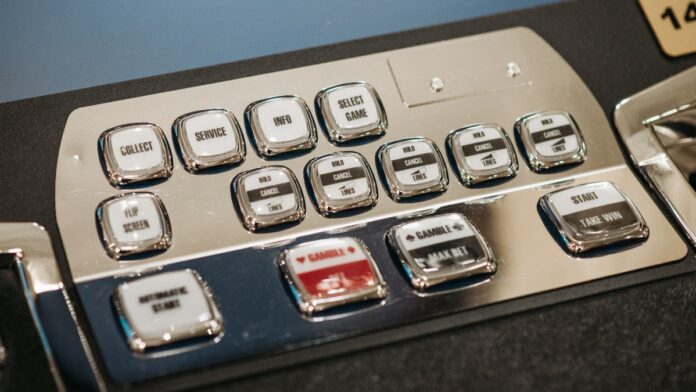Slot machines are the kings of casino gaming. They’re the most popular games on any casino floor and can offer jackpots that blackjack tables can only dream of.
But behind their blinking lights and catchy sounds lies an intricate system of calibration and customization. How much control do casinos really have over these machines? Can they significantly alter outcomes?
Simply put, can casinos control slot machines?
To answer these questions, we must peel back the layers of technology, regulation, slot payouts, and psychology that shape modern slot play.
The Mechanics Behind Slot Machines & Payouts
At their core, slot machines operate through Random Number Generators (RNGs). These are algorithms designed to deliver unbiased outcomes. The RNG constantly cycles through thousands of numbers every second.
When you press “spin,” the RNG stops at a number, which determines the symbols and their placement on the reels. Contrary to what many believe, the machine doesn’t “know” how much you’ve won or lost over time.
Each spin is entirely independent, dictated by pure math.
But here’s the catch: not all slot machines are equal. Developers can program different aspects of the gameplay experience. Then, casinos can choose machines that align with their goals. This brings us to two key metrics often associated with slot machines.
Understanding RTP & Casino Payouts
RTP, or Return to Player, is a percentage that indicates how much money a slot machine is expected to return to gamblers over millions of spins.
For example, an RTP of 96% means the machine is designed to return $96 for every $100 wagered, albeit over an extensive period.
Casinos cannot arbitrarily adjust a slot’s RTP on the fly, but they can set it to predetermined ranges provided by the manufacturer. Imagine a game with RTP configurations of 92%, 94%, 96%, and 98%.
The casino chooses the version that suits its strategy before deployment. Regulations may dictate minimum RTP levels, depending on the jurisdiction. For example, Nevada requires at least a 75% RTP, while in New Jersey, the minimum is 83%.
But what does this mean for players?
Well, it should be stated that a higher RTP doesn’t mean you’ll win more often. It simply determines the statistical return over time. A game with 98% RTP can still empty your wallet quickly due to short-term volatility.
Volatility and Variance: The Hidden Dynamics of Slots
Volatility is often overlooked by casual players, but it profoundly impacts your slot experience. High-volatility games have infrequent but large payouts, while low-volatility games offer smaller but more frequent wins.
Neither approach is “better” or “worse” – it’s about matching the game design to the player’s preferences. Casinos don’t have direct control over a machine’s volatility once they’ve purchased it. However, volatility is a design choice made by developers.
For instance:
- A game like Buffalo Gold is known for high volatility, appealing to jackpot seekers.
- Meanwhile, low-volatility classics like Starburst keep casual players spinning longer.
Understanding volatility is crucial because it directly influences player retention.
A casino looking to create a relaxed gambling environment may lean towards lower-volatility machines. On the flip side, a high-stakes section with high-volatility games may cater to thrill-seekers chasing big wins.
Casino Control: How Much Can They Really Adjust?
This is the billion-dollar question. While casinos have significant influence over slot customization, their powers aren’t limitless.
Here’s what they can adjust:
- RTP Settings: As mentioned earlier, casinos select from predetermined RTP options provided by slot manufacturers.
- Denominations: Casinos can program machines to accept specific bet ranges. Higher-denomination machines usually have better RTPs, incentivizing bigger bets.
- Progressive Jackpots: Casinos can link machines to shared jackpots, either across the property or even statewide, as is the case with Megabucks in Nevada.
Where things get murky is how these machines are modified over time.
Advances in technology now allow some slots to be reprogrammed remotely. For example, manufacturers like IGT and Aristocrat provide software solutions that enable casinos to update RTP values or game themes without physically opening the machine.
However, these changes often require regulatory approval and a system audit.
The Role of Regulators: Setting the Boundaries
Regulators are the gatekeepers of fairness in the gambling industry.
Bodies like the Nevada Gaming Control Board (NGCB) and the New Jersey Division of Gaming Enforcement (NJDGE) oversee slot machine standards.
They also mandate regular audits and software testing.
For example, the NGCB requires all slot machines to meet a minimum RTP of 75% and undergo rigorous third-party testing before deployment. They also perform random audits to confirm compliance – with hefty fines for violations in hundreds of thousands of dollars.
Actions taken by regulators include:
- Approval for Adjustments: Changes to RTP or game settings typically require regulatory approval and documentation to prevent fraud.
- Audits: Some jurisdictions mandate random machine inspections to verify compliance.
Technology and Flexibility: Modern Slot Machine Capabilities
With the advent of server-based gaming, modern slot machines have achieved unprecedented levels of flexibility.
Using central servers, casinos can now manage slot machines across an entire floor without manual intervention. Here’s what server-based systems enable:
- Dynamic Adjustments: Casinos can preconfigure machines to transition between themes (e.g., holiday-specific designs) or betting limits.
- Player Profiling: Loyalty systems can tailor offers, such as free spins, based on your gaming preferences.
- Variable RTP Slots: Some manufacturers now offer games with interchangeable RTP settings that can even vary by time of day (though this is highly regulated).
It’s important to note that while server-based systems add convenience, they don’t necessarily grant a casino unrestricted control. Regulations still require any significant adjustment to be logged and approved by oversight bodies.
Myths vs. Reality: Can Casinos Adjust Slot Machine Payouts on the Fly?
One persistent myth is that casinos “tighten” or “loosen” slot machines based on the day, time, or crowd size.
But, do casinos manipulate slot machines for real? Well, while modern slots offer some flexibility, the reality is more limited than conspiracy theories suggest.
Here’s why:
- Regulations: Any adjustment to a slot machine return rate is tracked and auditable. Real-time manipulation is neither practical nor legal in most jurisdictions.
- Player Tracking: Casino loyalty programs collect data, but this doesn’t allow them to rig outcomes. RNGs continue to operate independently to ensure fair play.
Despite these safeguards, casinos excel at leveraging perception to keep players engaged. Strategically placed big-win machines, clever sound design, and even the layout of slot floors contribute to an illusion of “luckier” areas.
The Ethics of Slot Calibration: Fair Play or Manipulation?
While casinos operate within the legal framework, ethical questions remain. If a machine has a deceptively low RTP or high volatility, and this isn’t made clear to the player, does it border on exploitation?
Industry insiders argue that the combination of sensory overload, fast-paced action, and opaque information creates an environment tilted in favor of the house.
To promote transparency, some jurisdictions require RTP and volatility details to be displayed in machine menus or brochures. However, these disclosures often go unnoticed by players.
Ultimately, the balance between fair play and profit drives casino decisions. This leaves players to navigate a complex—but entertaining—landscape.
Understanding the mechanics and limits of slot calibration is the first step to becoming a smarter, more informed gambler. And whether you’re chasing jackpots or just spinning for fun, remember: knowledge is your best bet.
Stay safe and gamble responsibly!







